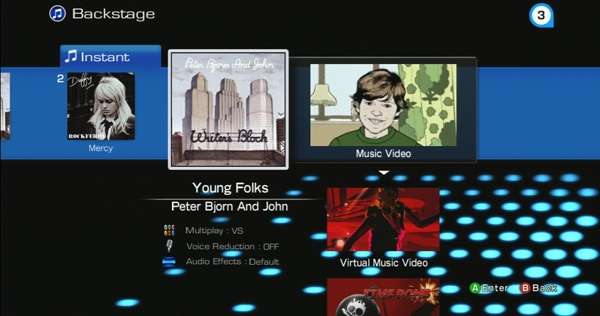Lips Xbox 360 Review

Karaoke is no longer exclusive to drunken workers at an office Christmas party or Japanese salarymen letting off steam, anyone is now able to test the patience and batter the eardrums of their friends and family in the comfort of their own homes.
Sony’s Singstar franchise isn’t close to being the first karaoke video games, but they are by far the most popular, especially in Europe, selling over 12 million copies. Having already been ‘inspired’ by Sony’s other casual gaming successes with EyeToy knock-off Xbox Live Vision and Scene It?’s homage to Buzz!, Microsoft have decided that they need some microphone peripherals for 360 gamers to put beside their camera and big-button controllers.
The microphones themselves are excellent pieces of hardware, in smooth black and white colours with stylish glowing LED’s at the base, and as is expected on a current generation console they are, of course, wireless.
The mics are also motion-sensitive, which adds a few nifty features. For example, at any time during a solo performance, a second player can simply shake their mic to instantly join in the singsong. Also, after bouts of good singing players will be given an onscreen pose to perform that activates a Guitar Hero-style ‘Star Stream’ to earn bonus points. Finally, when not singing, players can also tap or shake the mic to the beat to play an appropriate percussion instrument.
These movement-based features add an extra element to performing on top of the usual singing, and are a welcome addition to the genre, especially as so much else of Lips fails to even meet the standards set by the original PS2 Singstar over four-and-a-half years ago.

This game does not support the 360 camera, has no adjustable difficulty modes, no record of your highest scores on each song, no unlockables, no career mode, and no option to playback a recording of your vocals (although on second thoughts that might be for the best).
Lips is essentially the ‘Wii Music’ of the karaoke-gaming scene, with no way to fail a song and an extremely forgiving scoring system. Don’t worry if your voice wavers when you can’t hit the right note, because Lips will simply give you a Vibrato bonus! There are ten star-related ranks ranging from Rock to Big Bang, but even attempting songs that I don’t know the tune of and actively despise (I’m looking at you Chris Brown) I never saw anything below the fourth-highest rank of Super Nova.
Lips has clearly been designed as an accessible game that would be perfect to spark off some fun times during a party. The front-end menu is extremely stylish and simple-to-use, and the visual background of the game can be adjusted to many equally-snazzy styles and colours.
The Jukebox mode allows you to play a succession of music videos, either from a specific playlist that you’ve created, or simply a random selection. This is ideal to leave running on your TV during a party, and any would-be hit artists can simply pick up a mic, give it a shake and instantly start singing whatever song is currently playing.
Medals can be gained in six different categories, Pitch is rewarded for hitting the right notes, Stability given for holding those notes for the right length, Rhythm for well.. having rhythm, Technique for using vocal expertise like vibrato and Performance for successful gesturing to trigger Star Stream. People who aren’t currently singing can press buttons on the Xbox 360 controller to play various percussive noises and gain the Party medal.

It’s nice to give non-participants something to do, but it can be a bit off-putting if the guy with the controller isn’t tapping to the beat. The rewarding of medals can often feel somewhat arbitrary; as does the fact that the maximum score on each song doesn’t appear to be the same.
There are several party modes (unfortunately not including Pass-the-Mic), Vocal Fighters is a simple Vs. game which sees you scoring hits against your opponent with superior singing, Kiss is a co-operative mode in which successful duo singing brings a couple closer together and hopefully kissing, which is activated by a simultaneous tilting of microphones, and Bomb challenges you with dousing a constantly re-igniting fuse by singing to fill a glass with water and then tilting the mic to pour.
Whilst attempts to provide alternatives to straight singing are appreciated, these particular multiplayer modes end up being more distracting than entertaining. Sadly, the only online multiplayer feature that Lips has is the option to send a challenge to a friend to beat your score on a particular song. Once each player has had two attempts to get the best score the challenge is over and these high scores are not saved…
Of course, one of the major aspects of any musical game will be its songlist, and with 41 tracks Lips certainly beats any Singstar game in volume. Obviously, whether the tracklist is better is a matter of personal preference, but it undoubtedly has a decent mix of classics. Golden Oldies such as “Stand By Me”, “Another One Bites the Dust”, “Take On Me”, “It’s Raining Men” and “ABC” are excellent karaoke fodder, and newer songs like “Bleeding Love”, “Umbrella”, “Young Folks”, “Suddenly I See”, “White Flag” and “Yellow” work surprisingly well to warble along to.
Of course, being a current-gen music game, Lips also features the option of downloadable tracks complete with music videos at 160MS points (£1.36) a pop, although less than 10 tracks are available at time of writing, with more becoming available each week hopefully the Lips DLC will swell to rival the Singstar Store.

But wait! Why would you need to download tracks when Lips has the much talked-about feature of allowing you to import any songs from your own personal music collection? Surely you can just take any DRM-free tracks from your 360 HDD, mp3 player or network connected PC and wail away to your heart’s content?
Well, technically this is true (although iPod Touch and iPhone owners beware that your newfangled technology is not supported) but imported tracks do not include lyrics or any pitch rating at all. Strangely, the game still scores you on these tracks, but you could quite easily fart into the mic, and provided you could keep it up for the duration of the tune you’d end up with an impressive score. This means that importing any tracks is essentially pointless as there really isn’t any more interactivity than singing along to the radio.
Ultimately, the enjoyment that you’ll receive from Lips depends entirely on the people that you’re playing it with. Lips makes an excellent party title for non-gamers especially, and the whole package oozes contemporary coolness meaning that you’ll never be embarrassed to bring it out in front of friends. However, Lips disappoints by lacking in features in almost every area, and although the microphones set a new standard for future singing games to strive towards, the functionality is often worse than games nearly half-a-decade old.
